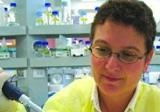Cancer collaboration
Scientists at the Lowy Cancer Research Centre say a new treatment approach for childhood cancer may also offer hope to adults with lung cancer.
Scientists at the Lowy Cancer Research Centre say a new treatment approach for childhood cancer may also offer hope to adults with lung cancer.

Scientists at the Lowy Cancer Research Centre say a new treatment approach for childhood cancer may also offer hope to adults with lung cancer.
The experimental therapy - developed to combat solid tumour cancers in children - is also effective in targeting one of the most lethal lung cancers in adults, according to the team led by UNSW Professor Maria Kavallaris at Children's Cancer Institute Australia (CCIA).
More than 9,000 Australians are diagnosed with non-small lung cancer each year. Currently, the prognosis for patients with an advanced form of the disease is poor, because tumours often become resistant to conventional drug therapy.
The Lowy Cancer Research Centre at UNSW is the first facility in Australia to bring together childhood and adult cancer researchers. The rationale for combining the research under the one roof was the potential for significant breakthroughs.
"The most common childhood cancers - those of the nervous system and leukaemia - are rare in adults; however, researchers are increasingly finding common pathways," says the head of the Centre's childhood cancer program and Executive Director of CCIA, Professor Michelle Haber.
By targeting a structural protein in drug resistant lung cancer cells, the Lowy Cancer Research Centre's novel therapy aims to increase the sensitivity of the tumour to standard chemotherapy drugs.
It uses a gene-silencing approach, the next wave of cancer therapeutics, to suppress this structural protein.
The promising results were presented this month at the Australasian Gene Therapy Society meeting in Melbourne.
"This therapy could advance new ways of approaching treatment of non-small lung cancer, which accounts for 80 percent of all lung cancers," said Professor Kavallaris, who is head of the Pharmacoproteomics Program at CCIA.
It is hoped that the therapy will also have significance for solid tumour cancers in children, such as neuroblastoma, one of the most aggressive childhood cancers.
CCIA scientists based at the Lowy Cancer Research Centre have been working closely with Benitec Ltd, an Australian biotechnology company with a dominant technology for silencing genes, to bring this new therapy from the laboratory to the clinic.
"Gene-silencing is looking very promising as the next wave of therapeutics. We have used this approach successfully in early stage HIV clinical trials in the US and believe that this same approach can be used for cancer and many other diseases," said Dr Peter French, Chief Executive Officer of Benitec Ltd.
Media contact: Daniella Goldberg, CCIA |02 9385 8475 |